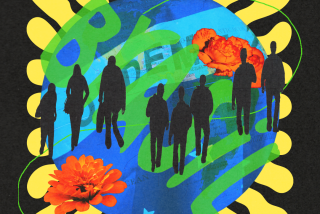Culture : Brazilians Get a Kick Out of Nicknames : Soccer players, doormen and presidents crave that informal touch. It’s a way of life.
- Share via
RIO DE JANEIRO — “Where I’m from, everybody has a nickname,” says Waldimiro Autran Dourado, a lawyer and author from the state of Minas Gerais. His is Waldo.
“That’s true all over, particularly among working-class people,” agrees Jorge Luiz Nascimento, a 52-year-old former police officer, now a Rio de Janeiro city administrator. Folks where he works call him Jorge Mamao (George Papaya).
How Dourado became Waldo and Nascimento was dubbed Papaya are long stories, but the short of it in Brazil is that almost everyone, from the president to the doorman, is addressed informally, either by the first name or a nickname.
It’s part of the Brazilian culture, explains anthropologist Everardo Rocha.
“We’re just a much more informal society, and that is particularly true when it comes to how we call each other,” he says. Like all Brazilian professors, Rocha is called by his first name by his students, despite his doctoral degree.
“Public people like politicians try to keep contact and intimacy with the people who vote for them,” the professor says. “Sometimes, if a politician is very important, people will call him by his whole name and also by his initial or by a nickname that is given to him as a tenderness.”
Americans got a taste of the Brazilian peculiarity during the World Cup. While other players wore their last names on their jerseys, Brazil’s team trotted on the field with nicknames and first names applied to theirs.
There was Dunga, for instance, whose moniker means Dopey, one of Snow White’s seven dwarfs. And Branco, a key scorer as the Brazilian team moved to victory in Pasadena last month. His nickname means Whitey. Some of the players were known by diminutives: Bebeto for Roberto and Jorginho, or Little George. And Muller, for which there seems no explanation.
Probably nowhere is the relaxed, informal manner in which Brazilians address each other more apparent than the way they refer to their leaders.
Every day, newspapers and television newscasts refer to the president, many Cabinet members and legislators by their first names. Others are routinely quoted using their nicknames.
It’s kind of like picking up a U.S. newspaper to read “Bill Considers Military Invasion of Haiti” or “Dick Negotiates Settlement to Los Angeles Bus Strike.”
The same goes for the field of 10 candidates vying this year for president. One is Fernando Henrique Cardoso, the nation’s former finance minister and architect of the country’s new economic plan.
“But nobody calls him Cardoso,” Rocha says. “He’s Fernando Henrique.”
Or he’s just FHC in headlines and photo captions.
Challenging Cardoso is a former factory worker and labor leader named Luis Inacio da Silva. But nobody calls him Luis or Inacio or Da Silva.
“He’s Lula to everybody,” says political scientist Venicio de Lima. Lula is a boyhood nickname that has been Da Silva’s moniker throughout his professional and personal life.
None of this is new in Brazilian politics. The man sworn in as the country’s president in 1985, following two decades of military rule, was Jose Sarney, except that isn’t really his name, even though heads of state, historians and his current colleagues in the Senate still refer to him as Sarney.
“His real name is Jose Ribamar,” says the author Dourado, alias Waldo, who has written a number of books on Brazil’s culture. “His father’s name was Ney. He worked for a British streetcar company. As a sort of a joke, a manager there used to call his father ‘Sir Ney’ and people in the area picked it up, except ‘sir’ became ‘sar.’ ”
Sarney is not alone. Take Congressman Chico Vigilante. The Chico is easy, a common nickname for Francisco. But Vigilante?
“His last name means watchman, but that’s not his real name,” says political scientist David Fleischer, a professor at the University of Brasilia. “He took that name when he was running for office because he used to be head of the watchman and bank guard union in Brasilia. Nobody around here even knows his real name.”
Then there’s former Congressman Pinga Fogo from Parana. Nobody knows his real name either. His moniker is one he adopted during his radio days when he hosted a popular show that recounted crime stories in gruesome, crusading detail. It means “Dropping fire.”
Brazilians without a nickname are almost invariably known chiefly by their first name.
“It’s not like in the United States where if you ask someone their name, they give you their complete name,” says Rocha, the anthropologist. “Here, we say our first name and that’s it.”
Consequently, many are the Brazilians who know their neighbors, co-workers, friends--and even their lovers--only by their first name.
“I don’t know the last names of most of my friends,” says Silvana da Silva, a domestic. “People never say, and you just don’t ask.”
“In Brazil, the family name is not so important,” says Jorge Antonio Barros, a hulking assistant city editor at the Jornal do Brasil known around the newsroom as Jorginho.
“For emotional reasons, we give more value to people’s first names. Even if people have a formal relationship, rather than call someone Mr. Barros, you’d call him Mr. Jorge.”
Brazilians so identify people by their first names that legislators are listed alphabetically by first name in the federal directory and the U.S. Consulate keeps two telephone directories, one alphabetized by last name and the other by first name.
Rocha conjectures that the more casual approach to names is partly a reflection of a Brazilian sense of cordiality and informality, one derived from the merging of the country’s Portuguese, African and Native Brazilian heritages.
“The Portuguese (colonialists and slave owners) were very formal,” he says. “But the way the Portuguese had to deal with the Indians and Africans made them less formal. Now it’s absolutely incorporated into the Brazilian way of calling people.”
Others say that Brazil is simply so overrun with a few common names like Da Silva, Dos Santos and Nascimento that people are looking for an identifiable difference.
“If you have Brazilian friends, they are called by their most unusual name,” says De Lima, the political scientist. “If they are Jose and they have a German middle name and a Portuguese last name, they almost assuredly will be called by their German middle name.”
Nobody, however, seems to know for sure.
Roberto Damata, a top anthropologist, ponders the question and then says: “It’s an interesting part of our culture that I’ve often wondered about. But to tell you the truth, I don’t have the slightest idea.”
The preponderance of identification by first name or nickname does have its drawbacks, as candidate Da Silva discovered in a 1989 campaign.
Election laws required that ballots list candidates’ legal names only. Because he was known almost exclusively in the press and among his supporters as Lula, he would surely lose a sizable chunk of his support because voters simply wouldn’t recognize him by his last name. So he had Lula, which means squid, added to his official name.
Not long ago, when the head of the country’s tax service decided to go after the incomes of many of the nation’s highly paid soccer players, he ran into a similar problem. Nobody in his office knew the players’ real or complete names.
In one small city in northeastern Brazil, the local bank has created a town directory correlating people’s nicknames to their first names so it can keep track of checks either signed by or written to nicknames.
In one of the odder twists of the language, one version of the Volkswagen Beetle, still in production here and officially called a Fusca, is known affectionately as a Fusca Fafa.
In the 1980s, Volkswagen changed the car’s style by adding large, round, protruding taillights. Brazilians quickly dubbed the new version the Fusca Fafa de Belem, shortening it later to Fusca Fafa. It seems the size and shape of the lights reminded many of the ample proportions of Fafa de Belem, a popular singer and sort of the Dolly Parton of Brazil. Thus, Fusca Fafa.
The term is so common now, says taxi driver Erison Aguiar, that “if you go to the auto parts store and ask for taillights for a Fusca, they will ask you, ‘Regular or Fusca Fafa?’ ”
More to Read
Sign up for Essential California
The most important California stories and recommendations in your inbox every morning.
You may occasionally receive promotional content from the Los Angeles Times.












